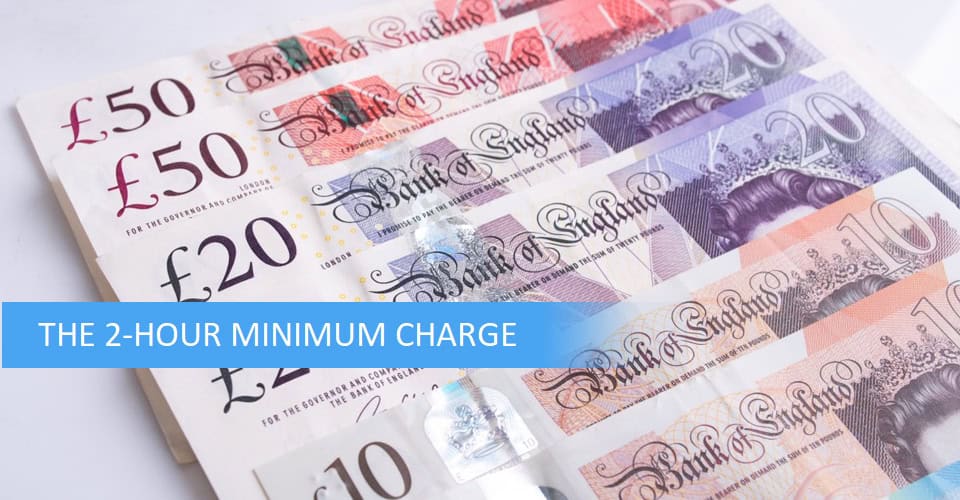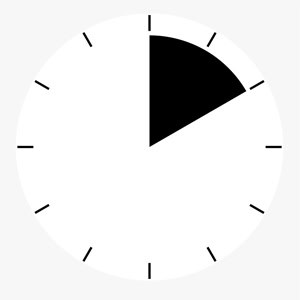2-Hour Minimum Charge (Detailed Explanation)

Whether you’re looking to hire a contractor to turn your house from drab to fab, bring in a Man with a Van to transport your goods, or need the skills of an interpreter to ensure nothing gets lost in translation, you’re likely to come across the two-hour minimum charge. But what is this charge exactly, and why are you expected to pay it?
The two-hour minimum charge is a standard business practice found in numerous industries. This charge is in place to ensure that the job that the service provider has taken on is financially viable and to ensure that the appropriate amount of time is dedicated to each paying customer.
Often, the subject of the two-hour minimum charge is heavily debated. Some find it unfair to the customer, while others feel that it’s a non-negotiable part of running a business these days. What are your views on this? To help you decide, here’s what you need to know about the two-hour minimum charge.
What Is The Two-Hour Minimum Charge?
 The two-hour minimum charge is exactly that: a minimum charge for two hours of a professional’s time. In a nutshell, a minimum charge is put in place to ensure that the service provider’s base costs to do a specific job are covered.
The two-hour minimum charge is exactly that: a minimum charge for two hours of a professional’s time. In a nutshell, a minimum charge is put in place to ensure that the service provider’s base costs to do a specific job are covered.
A two-hour minimum charge is sometimes referred to as an “appearance fee,” “base rate,” or a “minimum cost.” These terms, though different, essentially mean the same thing and can be used interchangeably.
The two-hour minimum charge exists to ensure that a service provider is adequately imbursed. In addition, it is also in place to make sure that the service provider spends an appropriate amount of time with the customer.
Because two hours is a very specific amount of time, you may be wondering where this time frame comes from.
Well, when you factor in the time, money, and effort spent in preparing to assist a customer, one hour is far too short a period. And three hours is generally much too long. As such, a period of two hours has been unofficially declared as a baseline for all to work with as service providers can complete most jobs during this time.
Why Is The Two-Hour Minimum Charge In Place?
 There are many different reasons why the two-hour minimum charge is in place. The specific reasons vary according to the service that is being provided and the industry norms in a given industry.
There are many different reasons why the two-hour minimum charge is in place. The specific reasons vary according to the service that is being provided and the industry norms in a given industry.
Generally speaking, the most prominent reason is that a service provider needs to factor in the following for every job they take on:
- Travel to the job location
- Travel from the job location back to the office or on to the next job
- Any billable time the service provider spent stuck in traffic or in congested areas trying to get to the job location
- Any prep work the supplier needs to do to be adequately prepared for the job
- Any special tools, supplies, or equipment they need to source for the job
All of the above can drastically impact the time and effort a service provider spends on each job.
Imagine if a service provider spent 20 minutes on the phone with you confirming the specifics of the job, an hour making sure they have the specific tools or software (or ordering what is needed) for the job, 30 minutes traveling to the job location, gets the job done in 25 minutes, and then spends 30 minutes traveling back to the office.
That’s a total of two hours and 45 minutes that this service provider has dedicated just to you and your job. Now imagine that they only get paid for the 25 minutes they actually spent doing the job.
As if the above was not compelling enough, another reason why the two-hour minimum charge is in place is to ensure that the appropriate amount of time is spent with each customer.
When you’re paying for a service, it is quite frustrating when the service provider appears to be in a hurry. This apparent rushed work can often lead to customers feeling like their business is not appreciated and can often lead to them doubting the level of quality at which the job was done.
Which Companies Charge A Two-Hour Minimum Charge?
 These days, all kinds of companies employ the two-hour minimum charge. In saying that, the two-hour minimum charge is most commonly found when dealing with tradespeople and contracting companies.
These days, all kinds of companies employ the two-hour minimum charge. In saying that, the two-hour minimum charge is most commonly found when dealing with tradespeople and contracting companies.
Many different types of companies across many different types of industries charge a two-hour minimum charge. Here are some examples:
- Movers
- Electricians
- Plumbers
- Translators
- IT professionals
- Copywriters
How Customers Can Benefit From The Two-Hour Minimum Charge
 Whether you need a service provided for 10 minutes or one hour and 59 minutes, you’ll often find yourself on the paying end of a two-hour minimum charge. If you fall into the former customer category, you may not be too happy about this.
Whether you need a service provided for 10 minutes or one hour and 59 minutes, you’ll often find yourself on the paying end of a two-hour minimum charge. If you fall into the former customer category, you may not be too happy about this.
But remember, even though the service provider is only assisting you for 10 minutes, they still used their billable time traveling to your location or doing prep for your job – and often they do both!
While the two-hour minimum charge is undoubtedly frustrating when the job you need to do is bound to take significantly less time, you technically have the contractor “all to yourself” for two hours.
Should you wish to make the most of the two-hour minimum charge, you could use this time to ask the service provider for:
- Help with other (similar) jobs you may have
- Identifying any other issues that you may run into based on your current setup
- Troubleshooting or maintenance tips for the job they’ve just completed
- Valuable knowledge about their industry and profession
Conclusion
And now you know all about the two-hour minimum charge and why it is in place. Though it can be a bother at times – especially when it comes to “smaller” jobs – it is generally viewed as a necessary and acceptable business practice.
As a customer, it is up to you to decide whether you’re willing to pay the two-hour minimum charge. If you’re not, your quest to find a service provider that doesn’t have this policy in place officially begins.
For your moving needs, drop by our website at Transport Executive.
References
- https://learn.linguabee.com/why-is-there-a-two-hour-minimum/
- https://www.lawinsider.com/dictionary/minimum-charges
- https://manwithavan.co.uk/blog/the-two-hour-minimum-charge-explained

